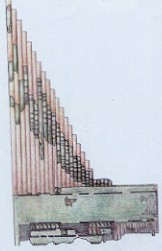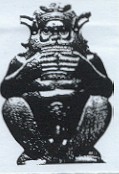The
Multiflute (Hydraulis) of Dion in
Macedonia and Pai Xiao in China
by
Theresa Mitsopoulou
 The
bamboo, the cane and reed have given
the inspiration for musical
instruments and were this material not
available in nature, the flute and the
multiflute may have never been
invented.
The
bamboo, the cane and reed have given
the inspiration for musical
instruments and were this material not
available in nature, the flute and the
multiflute may have never been
invented.
The flute
is a very simple instrument and
apparently it was invented by
accident. But the multiflute
(hydraulis and pai xiao) is on the
contrary, a product of advanced
technology. The instrument is
described by Heron of Alexandria, a
mathematician and expert in physics of
the 1st Century BC, and its
manufacture is attributed to
Ktisivios, an engineer in Alexandria
of that time. In 1992, during the
excavations at Dion, at the foot of
Mount Olympus, a multiflute was
discovered and declared "the earliest
musical instrument of that kind".
However one must take into
consideration that western
archaeologists are not familiar with
the art of the far east and in this
case they may have jumped to
conclusions about their exciting
find.
Ktisivios
had manufactured his instrument, which
worked with compressed air passing
through water, balancing the pressure
and sending the sound through tubes of
different height. In other words,
water entering the different sized
tubes displaced the air, and produced
the different tones of the musical
scale. The 19 corroded bronze
tubes of the instrument found at Dion
copied the bamboo found in nature. The
instrument was described as the
ancestor of the church organ harmonium
which Byzantium "donated to the west".
In Byzantium and Rome the playing of
this instrument was the privilege of
the emperor but it also had wide
secular use in the theater and the
hippodrome.
In NE
China in the graves of the aristocrats
of the 5th Century BC thousands of
personal items of the dead were found.
In the un-looted grave of Yi: Marquis
of Zheng they found about ten thousand
artifacts of jade, lacquer and bronze.
In fact there was over ten tons of
bronze. One of several musical
instruments found was a multiflute, or
pai xiao, of 13 bamboo tubes of
different heights, fastened
three rows by bamboo strips. It was
painted in red on a black background
and decorated with patterns of snake
symbolism (half lozenges or rope
design) for averting evil.
It was
believed that this instrument produced
melancholic sounds and it is said that
upon hearing it Confucius became
depressed and his food lost its
flavor. So to the already known
common instruments of the east and
west (flute, drum, tambourine,
cymbals, trumpet, guitar, lyre, harp,
bouzouki, zither-santouri) we must add
the multiflute, more evidence to the
one culture theory of
civilization.
Very often
ancient artifacts of the west seem to
predate those of the east, mainly due
to the almost total human and natural
destruction of the evidence in China.
However, the pai xiao is older then
the hydraulis of Alexandria since it
was found in a sealed tomb from 433
BC, long before the city of Alexandria
was even conceived.
|
|

Bronze Pan from the
British Museum. The
discovery of the flute was
attributed to the God Pan,
who was half-human and
half-goat with horns. The
Chinese also had a country
God with horns who used to
wear animal skin. He too
was called Pan (Gu)
|
A native of the
Salomon Islands in the
Pacific, playing the
Pan flute. It also
exists in Asia,
Europe, African and
South American
cultures. |





